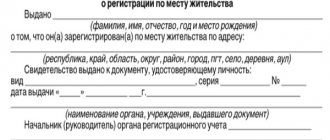The Labor Code in Article 77 indicates the ability of an employee to terminate employment relations with his employer of his own free will, as well as by agreement with him. Article 80 of the Labor Code establishes the obligation of a subordinate, in case of leaving work, to work for a two-week period, starting from the next day after writing the application.
The law does not have strict regulations regarding the conditions of dismissal and allows employees, in some cases, to quit without having to work for a specified period.
Rules for dismissal due to relocation
Dismissal due to relocation is equivalent to the dismissal of an employee at his own request. It is enough to submit a standard resignation letter to the HR department of the organization where the employee works. The only difference in such a statement in case of moving is the need to indicate the fact of moving to another city as the reason.
note
You can quit due to moving to another city without working a two-week period. According to Article 80 of the Labor Code of the Russian Federation, relocation is among the reasons that do not imply the possibility of further work, even within 14 days.
In the application, an employee can indicate as a reason not only his own move, but also the move of the serviceman’s spouse (transfer to another unit). Then the dismissal must also be made on the day indicated as the desired one.
Termination of contract due to change of residence
Step 1. We receive the employee’s application and supporting documents
In practice, an employee’s request for early termination of a contract is formalized in a written statement. The application must indicate:
- the reason why the employee requires early termination of the contract. In our case, a change in place of residence;
- desired date of dismissal.
Example of statement wording:
“I request early termination of the contract concluded with me on 02/21/2020 due to a change of residence.”
In addition to the application, the employee must provide the employer with documents confirming that his place of residence has changed. Such documents may be:
- a certified copy of the order (extract from the order) on the transfer of the spouse to work in another locality, along with a copy of the marriage certificate, other document on family composition;
- a copy of the spouse’s passport with a mark of registration at the place of residence in another locality, together with a certificate from his (her) place of work in this locality and with a document on family composition (copy of marriage certificate, etc.) ;
— a document on the acquisition of ownership of real estate in another locality (for example, an apartment purchase and sale agreement);
- a note in the passport about registration at the place of residence in another locality.
Let us note that simply the fact of a change of residence in order to demand early termination of the contract under Art. 41 TC is not enough. A change in the employee's place of residence must prevent him from performing work under the contract. In other words, create interference that delays the performance of work or significantly complicates its performance, or generally prevents the employee from performing work functions. In particular, this is possible when an employee moves to another city located at a considerable distance, for example from Minsk to Vitebsk. If an employee, for example, moves from the Frunzensky district of Minsk to Oktyabrsky, then such a move is unlikely to prevent him from performing work for this employer.
Attention! The obligation to provide supporting documents is not specified in the legislation. However, this follows from the essence of the situation, as well as from judicial practice. In the event of a dispute regarding forcing the employer to terminate the contract early, it is the employee who will have to provide the relevant evidence. If, when submitting an application, he does not provide supporting documents, the employer has the right to request them from the employee <*>.
Step 2. Review the received documents
When considering the application and supporting documents, the employer independently evaluates:
— Are the documents submitted sufficient? The employer may request additional documents if he considers that the attached ones do not confirm the stated circumstance (change of residence) or are insufficient.
Note : We believe that the employer has the right to terminate the contract with the employee early without requiring supporting documents from him. After all, the parties can do this at any time by agreement of the parties <*>;
- whether the reason stated by the employee really prevents him from performing work under the contract. That is, due to a change of place of residence, the employee has significant difficulties in fulfilling his work duties with this employer, or working for him becomes completely impossible.
Example
The worker got married and moved to live with her husband from Gomel to Vitebsk. In this regard, she turned to the employer with a demand to terminate the contract with her. The employer invited her to submit documents indicating a change in place of residence and the presence of obstacles in connection with this to perform the work. The employee presented her marriage certificate. According to the employer, such a document indicates marriage, and not a move to her husband, because the spouses are free to choose their place of residence <*>. The employee presented a note in her passport indicating registration at her place of residence in Vitebsk. The employer satisfied the employee's request.
Hint In practice, situations are possible when an employee cannot confirm the validity of his request for dismissal due to a change of residence. For example, does not submit relevant documents. Or his place of residence changes within the same locality, as evidenced by the registration mark in his passport. In this case, the employer may refuse to satisfy the employee’s request for dismissal due to a change of residence. The following situation is also possible. The employee is registered at his place of residence in one locality (for example, in Molodechno), and works in another (for example, in Minsk). Every day he travels to and from work, spending a lot of time on the road. I found a job in Molodechno and approached the employer in Minsk with a demand to terminate the contract early due to a change of residence. In such a situation, the employer does not have the obligation to dismiss the employee at his request. After all, the employee’s place of residence has not changed, it remains the same as when he was hired (Molodechno).
In a situation where the employer believes that a change of residence does not prevent the employee from performing work for this employer, or the documents presented by the employee do not convince him, dismissal does not occur. In this case, the employee has the right to go to court.
Step 3. We issue a dismissal order and familiarize the employee with it
If the employer believes that a change in the employee’s place of residence prevents him from performing work under the contract, he issues an appropriate dismissal order. As a rule, this is an order. When registering it, the requirements of the office work rules must be observed: Instructions for office work, STB 6.38-2016. The dismissal order refers to orders regarding personnel. Its registration number is supplemented with the letter “k”, because The storage period for a dismissal order in an organization is 75 years <*>.
The order, in particular, states:
- date of dismissal.
Attention! The employee is subject to dismissal from the date specified by him in the written application. This is due to the fact that in case of dismissal due to a change of residence, the period of notice by the employee to the employer is not determined by law. At the same time, we believe that a different date of dismissal can be established by agreement between the employee and the employer;
- grounds for dismissal with reference to clause 3, part 2, art. 35 TK.
The grounds for issuing an order are:
- employee statement;
— a document confirming the validity of the requirements stated by the employee.
An example of the wording of a dismissal order:
"FIRE:
Petr Andreevich PETROV, legal consultant of the legal department, 02/21/2020 at the request of the employee in connection with a change of residence that prevents the performance of work under the contract, in accordance with clause 3 of part 2 of art. 35 of the Labor Code of the Republic of Belarus.
Labor leave was used until January 30, 2020.
| Base: | 1. | Statement by Petrov P.A. from 02/07/2020. |
| 2. | Copies of pages of P.A. Petrov’s passport. with a mark of registration at the place of residence in Vitebsk.” |
The employee familiarizes himself with the dismissal order and puts his signature on it <*>.
Step 4. We make the final payment to the employee
As a general rule, all undisputed amounts due to the employee from the employer on the day of dismissal (except for payments established by remuneration systems, the amount of which is determined based on the results of work for a month or other reporting period) must be paid by the employer no later than the day of dismissal <*>. Payments established by remuneration systems, the amount of which is determined based on the results of work for a month or another reporting period (for example, bonuses), are made in the manner established by the LPA, no later than the day of payment of wages for the reporting period to employees of the organization <*>. Among the payments due to the employee on the day of dismissal <*>:
- salary for the period of work before dismissal;
— monetary compensation for unused labor leave. Moreover, if by the day of dismissal the employee has worked part of the working year, monetary compensation is paid in proportion to the time worked. If by the day of dismissal the employee has worked the entire working year (12 months minus the total duration of the labor leave to which the employee is entitled), then monetary compensation is paid for the full labor leave;
— other payments (for example, travel expenses).
Attention! Payment of severance pay in case of early termination of a contract due to a change of residence is not provided. The exception is cases of dismissal of the wife (husband) of a military personnel(s) in connection with the transfer of the spouse to serve in another area. In this situation, severance pay is paid in the amount of two months' average earnings <*>.
Currently, all payments are usually made to the employee by transferring funds to his bank account. Therefore, regardless of whether the employee was at work on the day of dismissal or not, the employer should not have problems with the final payment.
However, in some organizations, payments may be made from the organization's cash desk. In such a situation, if the employee did not work on the day of dismissal, the corresponding payments must be made to him no later than the day following the day the employee submitted a request for payment <*>.
The employee has the right to make such a demand orally. He can also contact the employer with a written statement. To avoid controversial situations, the second option is preferable.
Hint If the final payment is delayed, the employee has the right to recover from the employer the average salary for each day of delay. And if an incomplete payment is made - in proportion to the amounts not paid during the calculation <*>. Such a right arises for the employee only when the employer is at fault for these violations (intentional or negligent). Otherwise, the employee will not be able to recover the average salary from the employer for a delay in the final payment or for incomplete payment. In particular, if the cause of such violations was the actions of the employee himself (for example, he did not show up for payment, despite notifications from the employer).
Step 5. We make an entry in the employee’s work book
On the day of dismissal based on the dismissal order, the employer makes a dismissal entry in the employee’s work book. It must correspond to the wording of the order, that is, it must contain the same date and reason for dismissal, as well as a reference to clause 3, part 2, art. 35 TK. However, no abbreviations, such as “st.” instead of “article”, the entry should not contain. A record of dismissal at the request of the employee is made in the work book indicating the reasons that served as the basis for termination of the contract <*>.
An example of an entry in a work book about dismissal at the request of an employee
| Zvestki ab pratsi Information | |||||
| Numar entry Entry number | date | Zvestki ab pryome na pratsa, peravodze na inshui pratsa, zvalnenni (with the specified rule i sa rescue on the article, paragraph of the legislative act) Information about hiring, transfer to another job, dismissal (indicating the reasons and with reference to the article, paragraph of the legislative act) | On the document, a record was made (name of the document, date and number) On the basis of which the record was made (name of the document, its date and number) | ||
| number number | month month | year year | |||
| 1 | 2 | 3 | 4 | ||
| 11 | 21 | 02 | 2020 | Dismissed at the request of the employee due to | Order from |
| with a change of residence, | 02/21/2020 N 6-k | ||||
| clause 3 of part 2 of article 35 of the Labor Code | |||||
| Code of the Republic of Belarus | |||||
Step 6. We issue a work book to the employee
The employer is obliged to issue the work book to the employee on the day of dismissal (on the last day of work) <*>.
Upon receipt, the employee signs in the book for recording the movement of work books and inserts for them. There he must personally indicate the date of receipt of the work book <*>h. 6 p. 79 Instructions on work books).
Attention! The employer is responsible for the delay in issuing the work book if such a delay occurred through his fault <*>.
It is possible that on the day of dismissal the employee is not at work or he refuses to receive a work book. In this case, on the same day, the employer must send the employee a written notice of the need to appear for a work book or give written consent to send it by mail. In this case, the work book itself is not sent. The notice should be sent by registered mail with return receipt requested <*>.
Example of notice wording:
“We inform you of the need to obtain a work book PK N 1234567, which was not issued due to your absence from work on 02/21/2020. The work book can be obtained on weekdays from 09:00 to 18:00 at the HR department at the address: Minsk, st. Solnechnaya, 1.
You can also write a statement of consent to send it by mail. In this case, the work book will be sent to the address specified in the application no later than the next day after receipt of the application.”
From the date of sending such a notice, the employer will not be at fault for the delay in issuing the work book. If he sends it later or does not send it at all, he will violate the law.
Attention! If the employer is to blame for the delay in issuing the work book, then in this case he <*>: - pays the employee the average salary for the entire period of forced absence; - changes the date of dismissal to the day the work book is issued.
Additionally, we note that if the employee refuses to receive a work book, the employer will need to draw up a corresponding act indicating the witnesses present <*>.
Step 7. We notify the concerned authorities and prepare other personnel documents
After dismissing an employee, the employer must take a number of actions <*>:
— issue a personal card (make a note of dismissal on it and familiarize yourself with the employee’s record), if such cards are maintained in the organization;
— include a copy of the dismissal order, the employee’s resignation letter, and other documents that served as the basis for the employee’s dismissal in the personal file , if one has been opened. Complete the personal file with paperwork and transfer it to the organization’s archives;
- notify the military registration and (regional department of the KGB) about the dismissal of a person liable for military service (conscript). This must be done within a month ;
— fill out and submit form PU-2.
Read this material in ilex >>*
* following the link you will be taken to the paid content of the ilex service
Differences between dismissal when moving and dismissal at will
As noted above, there are practically no differences. The main difference is the ability to quit “one day” or after working for less than 2 weeks.
In this case, the personnel specialist will indicate in the work book in the information about dismissal that the employment contract with the employee was terminated at the initiative of the employee due to a move to another city (or due to the transfer of a spouse).
note
When moving to another city, it is recommended to immediately obtain reference documents upon dismissal, which may be useful in the future. For example, certificate 2-NDFL.
Duration of the procedure
The current legislation does not indicate within what period an employee who moves to another place of residence must be dismissed.
Due to the fact that in this case, most often the employment contract is terminated at the initiative of the employee, it is understood that he can do this at any time. Moreover, as was already written above, you will not have to work for two weeks , since a change of place of residence is a forced reason for leaving work.
In addition, you can resign at any time by agreement of the parties (if the employer agrees to this option). In this case, you can also avoid the mandatory two-week work period.
Employers should remember that they do not have the right to prevent an employee from voluntarily leaving his position. Moreover, in this case, the reason that prompted the employee to make such a decision does not matter. Any resistance from the company management will be a direct violation of labor laws.
Thus, if an employee moves to another place of residence, he can leave his current job of his own free will or on the basis of an agreement concluded with the company’s management. The main thing is to arrange everything correctly from the point of view of labor law. There is no need to work for two weeks, although by agreement with the employer, if the relationship is good, any date of dismissal can be agreed upon.
Errors when drawing up an application
Let us pay attention to common mistakes made by employees who submit such applications:
- Indication of the moving city. This is not necessary; it is enough to simply inform the employer that a decision has been made to dismiss the employee precisely because of the move.
note
Some employers may require proof of imminent relocation. In such cases, you can provide transport documents or a letter from a company that is ready to hire you at your new place of residence as evidence.
- If you can work 2 weeks after submitting your resignation, it is not necessary to indicate in the text of the application the date on which you are asking for your dismissal.
- Be sure to indicate the date of submission in your application.
How and when to receive payments when settling due to a change of residence?
As you know, upon final departure from the organization, the employee must be paid all amounts due by law. In most cases, this is wages for the last month of work and compensation for unused vacation.
The deadlines for the final settlement are clearly defined in labor law. According to Part 1 of Art. 140 of the Labor Code of the Russian Federation, all payments must be made on the day the employee is dismissed , that is, on his last working day. Currently, the preferred method of payment is non-cash. Most often, the amounts due are sent to the bank card of the departing employee.
If the employee was unable to receive the money on the last day due to absence from work, then these amounts must be sent to him no later than the next day after the relevant request is presented to the employer.
Entry in the work book
In most cases, when a dismissal occurs due to a move to another city, a standard entry about dismissal at the request of the employee is made in the work book, which is used to take into account the length of service.
When an employee resigns due to the transfer of a spouse to serve in another locality, the following entry is made in the work book:
Refusal of an employee to move with the employer
Having received a notice with a proposal to transfer to work in another city, the employee must respond to it. It should be noted that if the employee does not respond within the period specified by the notice, the employer has the right to dismiss him. Because such silence can be regarded as a refusal to translate.
The form for refusal is not established by law. The main thing is that it is written and submitted on time. Therefore, the employee comes up with the wording on his own. It is assumed that the refusal can be issued as a separate written response in the form of a statement (notification) or as a short note on the transfer proposal itself. There is no need to justify your answer (refusal). Next, it is proposed to consider both refusal options.
The note on the refusal to transfer that the employee puts on the employer’s offer is formulated very briefly. It is enough to write down: “I agree to the translation.” Next, you should put a personal signature with a transcript.
If the refusal is written separately, for example, in the form of a notice, then such a phrase will no longer be enough. Then you will need to specify your refusal, maybe even indicate its reasons, and also note that this is precisely a response to the employer’s proposal. As an option, you can consider the following standard wording of the refusal: “In response to your proposal No. 2 of September 11, 2021, I inform you of my refusal to transfer to work in Bryansk.”
To this wording, you can add the reason for the refusal, then it will look like this: “In response to your proposal No. 1 of September 13, 2021, I inform you of my refusal to transfer to the city of Gagarin due to the fact that the road to the place of work and back will be take more than 4 hours a day.”
When indicating the reason for the refusal, the employer, at his discretion, can, but, in fact, is not obliged, to offer some kind of compromise, assistance in resolving the issue that prevents the transfer. For example, if the refusal is associated with a long journey to the place of work, then the employer can offer delivery by company transport to work and back home.
Employer's liability
If an employer refuses to dismiss an employee due to a move, administrative measures in the form of a fine may be applied to him. For officials, the amount of the fine varies from 1,000 to 5,000 rubles. For legal entities, the fine can reach 50,000 rubles. Such punishment is provided for in paragraph 1 of Article 5.27 of the Code of Administrative Offenses of the Russian Federation.
Dismissal for absenteeism is the termination of an employment contract for a one-time gross violation of labor discipline. Since this procedure is a type of disciplinary sanction, any failure to comply with the standards prescribed by the Labor Code of the Russian Federation may lead to the reinstatement of the offender at work. In order to minimize violations during this personnel procedure, Rostrud published a report.
Order to dismiss an employee under clause 9 of Art. 77 Labor Code of the Russian Federation
If the organization does not use standard forms T-8 (T-8a), then, accordingly, all orders are issued according to a certain template developed independently. But the wording that is included in it is drawn up arbitrarily. The text part of the dismissal order, taking into account the situation under consideration, can be executed as follows.
Order No. 1 of 09.09.2021 on dismissal from work
Fire:
Translator of the information department Samuil Arkadyevich Volsky from 09.10.2021 in connection with his refusal to transfer together with the employer to Krasnoyarsk in accordance with clause 9 of Art. 77 Labor Code of the Russian Federation."
Base:
- Notification of refusal to transfer Volsky S.A. dated 09.09.2021.
- Order on changing the location of Gran LLC No. 45 dated August 30, 2021.
Head of the organization:
(position) _____________ (signature) _______________ (transcript) ____________
I have read the order:
(signature) _______________ (date) __________
From the above example it follows that, both in the standard form T-8 (T-8a) and in the order developed independently, the details of the document (No., date), position and initials of the dismissed person, as well as the reason and date of dismissal should be indicated. The information listed is mandatory and must undoubtedly be present in the order.
Actions on the part of the manager necessary to break the business relationship
After the manager receives an application from an employee demanding to sever the business relationship in connection with the move, he is obliged to begin completing all the necessary documentation for this.
The dismissal process occurs in several stages:
- publication of the order. In order to legally draw up an order, the employer must use the form numbered T-8, which was put into effect by the State Statistics Committee of Russia on April 5, 2004.
.
In addition to general data about the dismissed person, the order should note that the termination of the employment contract occurs at the personal request of the employee, and also mention the third paragraph of the article under number 77 and note that the employer has a statement on the basis of which he produces the data actions. - Make an entry in the employee registration log and personal file. Each organization has an internal employee register, in which, in the event of dismissal, you must remember to make a note.
You also need to make a similar entry in the personal file of the moving individual. - Return of work book. In order to correctly make a note in the employee’s employment document, it is necessary to indicate that he was dismissed on his own initiative in connection with a move that was predetermined by a valid circumstance.
For example, the entry may look like this: “Dismissed due to disagreement to move to another place of work located in another territory, article number 77 of the Labor Code, paragraph nine.”
In the line where information about the severance of the employment relationship is displayed, you need to refer to Article 77 and mark the item that corresponds to the specific situation.
Payments due
The resigning employee is entitled to the following funds:
- salary for the entire period worked;
- compensation for vacations that were not taken off;
- severance pay to employees who quit due to their refusal to go to a new place of work in the same company (its amount is equal to 2 weeks of average earnings).
For your information
Similar severance pay is also paid to employees whose military spouses are forced to move to a new duty station. In this case, the funds are credited to them not from the employer’s fund, but from the federal budget (according to paragraph 3 of the Order of the Ministry of Defense dated July 11, 2002, number 265).
Dismissal without service due to relocation is permitted by Russian labor law. The rule on the employee’s obligation to work is not mandatory. The most preferable option is to terminate the relationship with the employer by drawing up an appropriate agreement. The law defines leaving for another city for permanent residence as a valid reason for dismissal without mandatory service.
List of documentation to confirm the move
In the event that an individual breaks off an employment relationship, citing a move for a valid reason, the manager must require certain documents from him.
It is imperative to provide either the passport itself, which contains information about the extract from the previous home, or a photocopy of it, as well as all kinds of additional documents related to the reason for the change of residence.
This could be a sick leave certificate, a medical certificate, a photocopy of the spouse’s work record with a note about a change of workplace, as well as some other documents.






